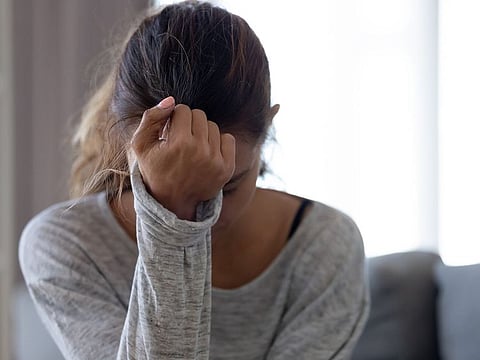India may face mental illness pandemic post COVID-19, say experts
Sharp rise in anxiety, stress and depression reported

Thiruvananthapuram: India appears to have reached its COVID-19 peak as daily numbers of new patients have fallen from around 90,000 to 50,000 but there is a warning from medical experts: As Covid retreats, a mental illness pandemic is likely to sweep the country.
According to them, there is a two-fold challenge India is likely to face as it gets over the spread of Covid, namely a sharp rise in mental diseases like anxiety, stress and depression, which in turn is a trigger for diabetes.
Lockdown blues
India’s stringent lockdown which is into its eight month this week, has severely impacted the economy, and thrown millions out of jobs. The situation is hurting for the country’s youth, particularly the 15 million who have been entering the job markets each year.
The resultant jobs crunch is poised to add to stress and depression, which are triggers for diabetes.
Ironically, India’s president Ram Nath Kovind while addressing graduating students of the National Institute for Mental Health and Neurosciences in Bengaluru in 2017 had warned, “India does not simply have a mental health challenge, it is facing a possible mental health epidemic.”
India already leads the world, along with China and the US, in anxiety, schizophrenia and bipolar disorder.
Shortage of medics
“India has only a mere 6,000 psychiatrists for a population of 1.40 billion. According to World Health Organisation norms, there must be at least one psychiatrist for each 100,000 population. By that yardstick India must have a bare minimum of 14,000 psychiatrists. We are not going to reach that number anytime soon”, Dr. Roy Abraham Kallivayalil, who was the secretary general of the World Psychiatric Association until earlier this month, told Gulf News.
He said all the pain inflicted by the economic and social impacts of the lockdown would lead to a pandemic of mental illnesses after we got over Covid.
Children, adolescents affected
Kerala state president of the Indian Psychiatric Society, Dr. Thomas John said children and adolescents were the most affected as their regular routines were affected, classes were disrupted and many were practically cocooned at their homes without a chance to mingle with friends.
“Even though Covid is a physical illness, its impact on mental health is unimaginable,” Dr. John said adding that society ought to be prepared for increased cases in the coming days.


Scarce statistics
Mental health statistics are scarce in India, with the only recent nation-wide survey having been done by NIMHANS during 2014-16. That survey had shown that as many as 10.6 per cent of the population had some mental morbidity.
And the treatment gap for various mental ailments ranged between 28 per cent and 83 per cent. Many patients in India do not take medical help either because of the stigma attached to mental illness or because treatment is expensive.
Meanwhile, Covid-induced anxiety, stress and depression are already triggering diabetes in many people and the sales of diabetes-related equipment from insulin pumps to glucometers are breaking records. Pharma industry data point to India’s glucometer sales poised to double from the current level of Rs 5 billion per annum.
Silver lining
One silver lining in recent years has been the enactment of the National Mental Healthcare Act, 2017. The Act includes mental illnesses also in the list of diseases for insurance coverage.
Manoj Chandran, CEO of Bengaluru-based White Swan Foundation for Mental Health says the COVID-19 pandemic has created visibility for mental health care, and that it is a time for influencers to play their role in addressing the challenges in this sector.

Sign up for the Daily Briefing
Get the latest news and updates straight to your inbox






